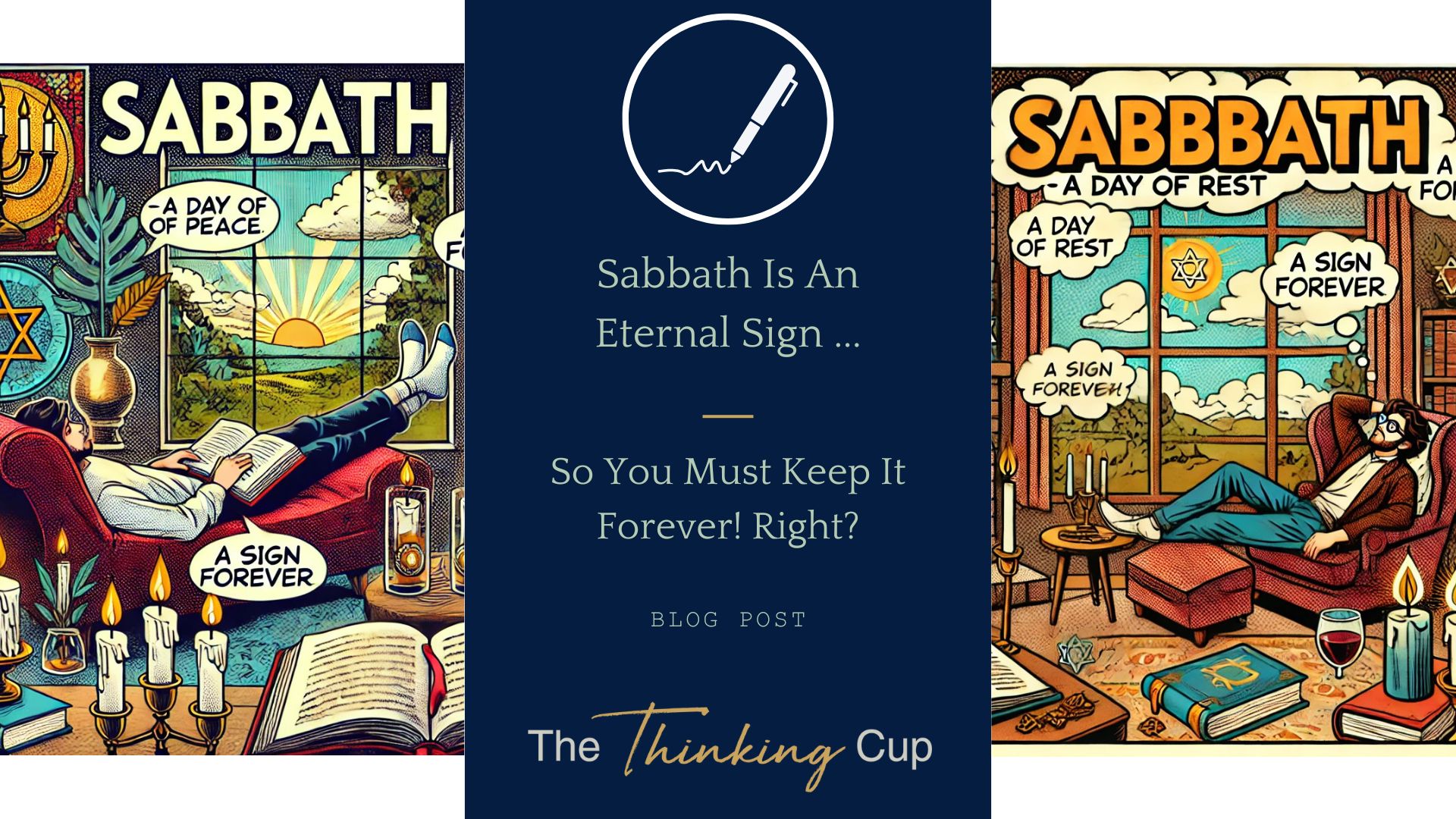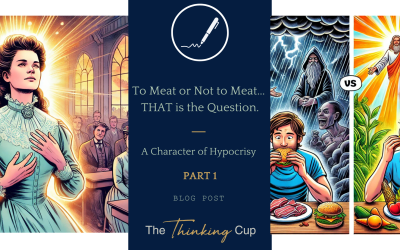Should we understand the Sabbath as an ‘eternal sign’ described in Exodus 31:12-17?
Exodus 31:12-17 serves as a foundational text for Adventists to argue that Sabbath-keeping is mandatory for salvation, universally binding, and eternal. However, this passage is often misused by focusing on isolated parts to support their theological positions while disregarding critical context and other elements of Scripture. This selective use of scripture, known as proof-texting, is a recurring issue in their theological approach. By ignoring important details within the same passage and the broader biblical narrative, Adventists build a theological framework that is inconsistent and unsustainable.
The passage itself reads:
“And the Lord said to Moses, “You are to speak to the people of Israel and say, ‘Above all you shall keep my Sabbaths, for this is a sign between me and you throughout your generations, that you may know that I, the Lord, sanctify you. You shall keep the Sabbath, because it is holy for you. Everyone who profanes it shall be put to death. Whoever does any work on it, that soul shall be cut off from among his people. Six days shall work be done, but the seventh day is a Sabbath of solemn rest, holy to the Lord. Whoever does any work on the Sabbath day shall be put to death. Therefore the people of Israel shall keep the Sabbath, observing the Sabbath throughout their generations, as a covenant forever. It is a sign forever between me and the people of Israel that in six days the Lord made heaven and earth, and on the seventh day he rested and was refreshed.’ ”” (Exodus 31:12–17, ESV)
Selective Reading and Proof-texting in Adventist Theology
Adventists extract key phrases from this passage to argue that Sabbath-keeping is perpetual and mandatory for all believers, such as “my Sabbaths” (v. 13), “a sign” (v. 13, 17), “sanctify you” (v. 13), “covenant forever” (v. 16), and “forever” (v. 17). However, this selective reading overlooks several important elements of the text.
From the outset, it is clear that God directed Moses to speak to the people of Israel under the Old Covenant. The covenant relationship being described here does not extend to Gentiles or Christians under the New Covenant. God is speaking specifically to Israel, as indicated by the direct reference to “the people of Israel” in verse 16. The covenantal laws here were meant for a particular time, place, and people—not for the Christian church under the New Testament. Once you start pulling Old Testament laws out of their covenantal context, you are in danger of misappropriating scripture and, therefore, will inevitably miss-apply it.
“Recent studies [1] have shed much light on the form of the OT covenant. It bears a marked resemblance to the form used in other Near Eastern texts for drawing up treaties and collections of law. This is entirely appropriate, for the Sinai Covenant was at once a treaty between God and Israel and laws imposed on the nation.” [2]
This clear context is often ignored by Adventists, who instead engage in Replacement Theology, using passages like Romans 2:28-29 to argue that Christians are “spiritual Jews” and thus required to observe the Sabbath. However, this interpretation overlooks the clear distinctions between the Old and New Covenants. The New Testament does not prescribe Sabbath-keeping as a universal requirement for believers; instead, the Sabbath was a specific sign for the nation of Israel, marking their identity as God’s covenant people under the Mosaic Law (cf. Ezekiel 20:12-20).
The Death Penalty for Sabbath Violations: A Critical Overlooked Element
Another aspect that Adventists often ignore is the prescribed punishment for violating the Sabbath. Verse 14 clearly states that any Israelite who profanes the Sabbath “shall be put to death,” and whoever does any work on that day “shall be cut off from among his people.” This same death penalty is reiterated in verse 15 and again in Exodus 35:2-3, where even lighting a fire on the Sabbath was forbidden. In Numbers 15:32-36, a man is stoned to death for gathering sticks on the Sabbath.
Adventists rarely, if ever, address the death penalty, which was part of the Old Covenant’s Sabbath regulations. They advocate for keeping the Sabbath but do not enforce the severe penalties that the Old Testament mandated for violations. This selective application of the law reveals a significant inconsistency in their theology. If the Sabbath is still binding “forever,” as they claim, why are the penalties for breaking it not equally binding? The omission of this element exposes the subjective nature of their hermeneutics, where only certain aspects of the law are deemed applicable, while others are conveniently discarded.
The Meaning of “Forever” in the Context of the Covenant
Adventists often point to the use of the word “forever” (from the Hebrew olam / עֹלָ֑ם) in verses 16 and 17 to argue that the Sabbath is an eternal institution. However, the Hebrew word olam does not always mean “eternally” in the way we understand the term in modern English. Olam can mean “a long duration” or “perpetual” but is context-dependent. In the context of the Old Covenant, olam meant “throughout their generations” (v. 13, 16), referring to Israel’s national existence under the Old Covenant.
It is essential to understand that the Hebrew word olam can have at least eight different contextual meanings, depending on what context the word is used in. The New International Dictionary of Old Testament Theology and Exegesis is quick to rightly point out these different possibilities:
עוֹלָם (ʿôlām):
-
- The basic meaning of the noun(s) is the farthest time, distant time. It does not seem to mean eternity in the philosophical sense of the word, although there are a few verses where the meaning of the noun(s) is very much like the idea of eternity.
- When referring to the past, the noun is frequently used in constructing phrases to modify other noun(s). In such cases, it essentially means “ancient.”
- The noun is also used with the preposition min, meaning “from ancient times, from antiquity.”
- Much more frequently, עוֹלָם refers to the future. It can refer to a future of limited duration; i.e., to conditions that will exist continuously throughout a limited period of time, often a single life span.
- In many more cases, the noun is used with longer time periods in view—indeed, it often implies unceasingness or perpetuity.
- The noun is used frequently in connection with the idea of covenants between God and humanity. God’s unconditional promises to his people are often described as perpetual or eternal (בְּרִית, covenant).
- As different aspects of God stretch back to antiquity, so do various aspects stretch forward into perpetuity.
- There are a few references in which the noun עוֹלָם is used to denote all time, stretching both forward and backward. [3]
So, one must be careful not to apply the wrong contextual understanding to the right text. As we can easily see by using a Bible Concordance, this is not the only instance in the Old Testament where the word olam is applied to covenant practices that were eventually fulfilled or ceased. Other Old Covenant rituals and practices are described as “perpetual” or “everlasting” using the same word olam.
These include:
-
- Circumcision (Genesis 17:10-14)
- The Passover (Exodus 12:14, 24)
- The Day of Atonement (Leviticus 16:29-31)
- The Feast of Tabernacles (Leviticus 23:41-43)
- The Levitical Priesthood (Exodus 29:7-9)
Adventists accept that these “perpetual” practices have ended and no longer need to be observed in their literal Old Covenant form. However, they argue that the Sabbath is different, insisting it remains binding. This creates a theological contradiction. If olam means “forever” in the case of the Sabbath, why does it not mean “forever” in the case of these other rituals? There is no solid exegetical basis for treating the Sabbath differently from these other practices, which also ceased under the New Covenant.
The Sabbath and the New Testament
Adventists claim that the New Testament reinforces Sabbath-keeping for Christians, but this is not supported by a close reading of the text. In the New Testament, Jesus is seen engaging with Sabbath laws, often challenging the rigid interpretations of the Pharisees (Mark 2:27-28, Luke 6:1-5). While He respected the Sabbath, He also declared,
“The Sabbath was made for man, not man for the Sabbath.” (Mark 2:27, ESV)
Here, Jesus clearly emphasizes its purpose rather than its rigid legal enforcement.
Furthermore, key New Testament passages indicate that the ceremonial aspects of the law, including the Sabbath, were fulfilled in Christ. For example:
“Therefore let no one pass judgment on you in questions of food and drink, or with regard to a festival or a new moon or a Sabbath. These are a shadow of the things to come, but the substance belongs to Christ.” (Colossians 2:16–17, ESV)
“But now that you have come to know God, or rather to be known by God, how can you turn back again to the weak and worthless elementary principles of the world, whose slaves you want to be once more? You observe days and months and seasons and years! I am afraid I may have labored over you in vain.” (Galatians 4:9–11, ESV)
Hebrews 4:9-10 points to Jesus as the ultimate Sabbath rest, fulfilling the Sabbath in a spiritual, redemptive sense.
“So then, there remains a Sabbath rest for the people of God, for whoever has entered God’s rest has also rested from his works as God did from his.” (Hebrews 4:9–10, ESV)
Adventists’ insistence on Sabbath-keeping as a salvific requirement is directly contradicted by the New Testament’s teaching that believers are not bound by the ceremonial laws of the Old Covenant, which includes the Sabbath.
Unfortunately, Adventist theology regarding the Sabbath relies on selective interpretation of scripture, or proof-texting, to support their belief in the perpetual observance of the Sabbath. Adventists construct an inconsistent theological framework by ignoring key contextual details, such as the specific audience of Exodus 31:12-17 and the penalties prescribed for Sabbath violations. Their interpretation of olam to mean “forever” for the Sabbath but not for other Old Covenant practices further highlights the contradictions within their approach. Ultimately, the New Testament teaches that the ceremonial aspects of the law, including the Sabbath, were fulfilled in Christ, freeing Christians from the legalistic observance of specific days.
In Christian Love,

[1] Basic treatments in K. Baltzer, The Covenant Formulary (Oxford: Blackwell, 1971); D. J. McCarthy, Treaty and Covenant (Rome: Biblical Institute Press, 1963); and with particular reference to Deuteronomy see M. Weinfeld, Deuteronomy and the Deuteronomic School, pp. 59ff.; J. A. Thompson, Deuteronomy (London: IVP, 1974), pp. 14ff.; P. C. Craigie, The Book of Deuteronomy (Grand Rapids: Eerdmans, 1976), pp. 20ff.
[2] Gordon J. Wenham, The Book of Leviticus, The New International Commentary on the Old Testament (Grand Rapids, MI: Wm. B. Eerdmans Publishing Co., 1979), 29.
[3] Willem VanGemeren, ed., New International Dictionary of Old Testament Theology & Exegesis (Grand Rapids, MI: Zondervan Publishing House, 1997), 346-350.




0 Comments